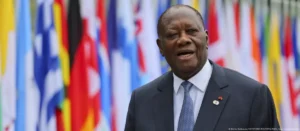President Alassane Ouattara, a former banker, has been credited with boosting the country’s economy. However, critics argue that he has increasingly consolidated power and strongly oppose his bid for reelection. He has been leading Ivory Coast since 2011.
Ivory Coast President Ouattara Confirms Fourth-Term Bid Amid Rising Political Tensions
President Alassane Ouattara of Ivory Coast announced on Tuesday that he will seek a fourth term in the upcoming presidential election scheduled for October 25, despite mounting criticism and a tense political atmosphere caused by the disqualification of several major opposition figures.
Although his party, the Rally of Houphouetists for Democracy and Peace (RHDP), had already nominated him, Ouattara delayed making his candidacy official until now. The 83-year-old leader defended his decision by stating, “I am running because the constitution permits it, and I am in good health.”
The opposition strongly contests the legitimacy of a fourth term, calling it unconstitutional. They argue that Ouattara has overstayed his welcome in power and accuse the government of using legal strategies to sideline potential challengers.
A U.S.-trained economist and former international banker, Ouattara has been at the helm since 2011. While he has earned praise for guiding Ivory Coast through a decade of economic growth—with the IMF projecting a 6.3% GDP increase this year—his critics say he has consolidated too much power and stifled democratic progress.
Ouattara initially suggested he would retire but instead ran for a third term in 2020 after a new constitution reset term limits. That election, boycotted by the opposition, resulted in a landslide victory for Ouattara but was overshadowed by violent clashes that left at least 85 people dead.
His political career has also been shaped by the trauma of the 2010 election, when then-incumbent Laurent Gbagbo refused to concede defeat, triggering a brief civil war that killed over 3,000 people and ended with Gbagbo’s arrest.
Political analyst Arthur Banga notes that Ouattara’s key achievements lie in economic stability and strengthening the country’s international presence. However, he warns that “democratic challenges remain,” pointing to persistent fears of electoral violence.
The opposition has intensified its criticism after prominent candidate Tidjane Thiam was barred from running due to his former French citizenship, which violates Ivorian laws against dual nationals seeking the presidency. In response, the country’s two leading opposition parties have joined forces, demanding that their disqualified leaders be reinstated ahead of the vote.
The government maintains that its judiciary functions independently, though skepticism remains high as tensions escalate ahead of the contentious election.